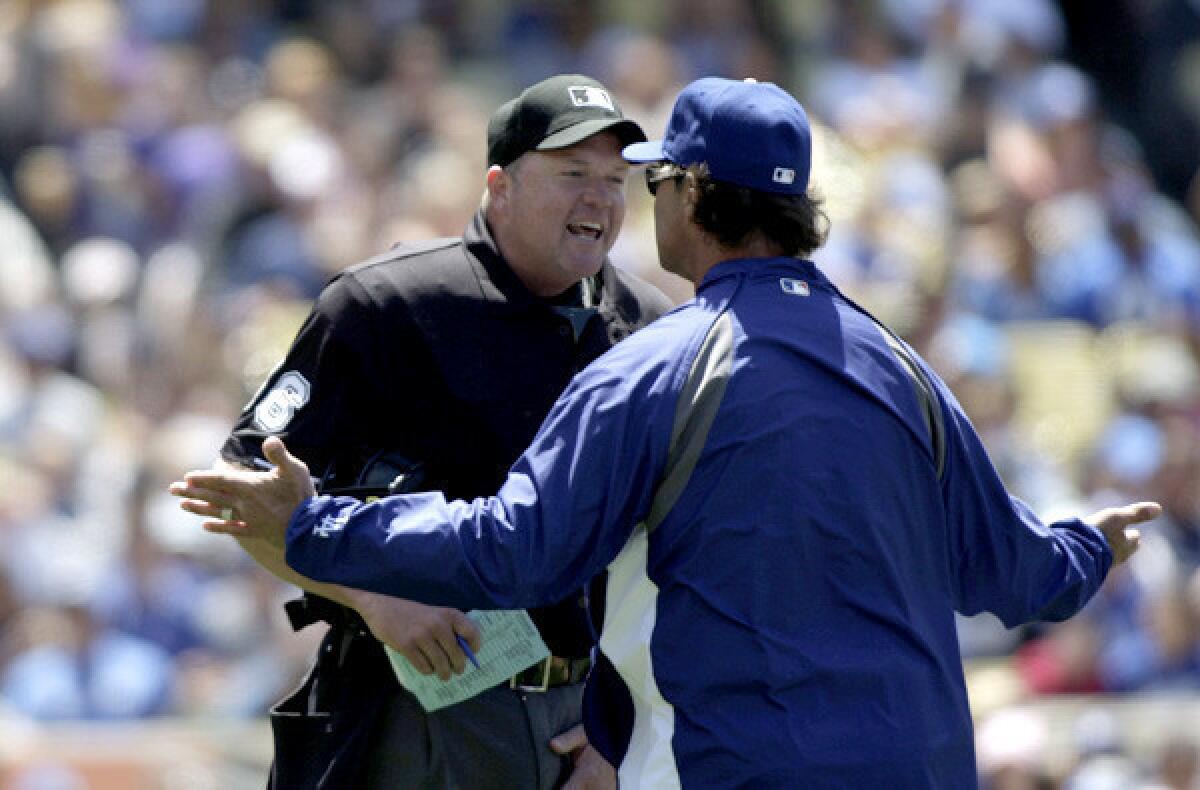Baseball gets it right with expanded replay

- Share via
Baseball’s installation of instant replay Thursday is about more than an ancient sport finally embracing the wonders of technology,
It is also about one of the crudest sports finally embracing the wonders of humanity.
“Kill the ump!” will become “Challenge the ump!”
Storming from the dugout to confront an umpire over a perceived slight will be considered a waste of valuable video viewing time. Bumping chests with that umpire will only delay his debate-ending phone call from the major league office. Kicking dirt on that umpire’s shoes will be viewed as useless and irrelevant as, well, kicking dirt on somebody’s shoes.
Baseball has long been the only sport to allow the prolonged dispute of its official’s decisions, their nightly acts of public bullying disguised as tradition. This new and shiny toy should curb that tradition. The umpires can now get it right even when they get it wrong, so maybe some of these grizzled guys in tobacco-stained shirts will finally shut up and sit down.
“Kill the ump” will become “Check the replay!”
The ironically perfect thing about baseball’s instillation of full instant replay is that it does not require a second look or video examination, or further review.
This is an unquestionable home run.
Commissioner Bud Selig, after overseeing a change that will have more powerful impact on his strengthening legacy than even the invention of the wild card, said, “I am very pleased that instant replay will expand to include additional impactful plays.”
Impactful enough, in fact, to change baseball history.
If there had been instant replay in the ninth inning of Game 6 of the 1985 World Series, Don Denkinger’s ruling that Jorge Orta was safe at first base is overturned and the St. Louis Cardinals win a World Series that the Kansas City Royals won a night later.
If there had been instant replay in the eighth inning of the first game of the 1996 American League Championship Series, a 12-year-old kid named Jeffrey Maier is called for fan interference on Derek Jeter’s fly ball. That ball is not ruled a home run, the Yankees don’t win the game, and a dynasty is either stalled or derailed.
And, of course, if there had been instant replay, Reggie Jackson’s hip check of Bill Russell’s throw in Game 4 of the 1978 World Series is successfully challenged by Tom Lasorda, and maybe the Yankees don’t come back from a 3-0 deficit to win the game and tie a series they eventually won.
“Missed call, terrible call,” Lasorda remembered Thursday. “But you know something? Our team messed up some things in that World Series too.”
It should only figure that one of the greatest umpire debaters in baseball history is not thrilled with a full instant replay system that should end those debates.
“That’s right, I don’t like what they did with instant replay; baseball should just leave it alone,” Lasorda said. “Baseball tries to get too fancy. The umpires miss, what, one call every three or four games? So they’re human. We’re all human. What’s wrong with that?”
There undoubtedly will be many voices that echo Lasorda, traditionalists understandably complaining that replay will remove the human element that makes baseball so special while making a sometimes agonizingly slow sport even slower.
This column was to be one of those voices. But watching bad calls in big games taunt us from the video highlights changed this opinion.
If they have the technology, why not use it? Baseball’s umpires are unquestionably the best officials in all of sports, but if their ultimate goal is to “get it right,” then why not do whatever is necessary to get it right?
Tony La Russa, a member of the committee that devised the system, said the goal was not to affect every play, but only to fix the “dramatic miss.”
This is baseball’s olive branch to the purists. For the first six innings of games, only a manager’s challenge can change a call. They are guaranteed one such challenge, with a second challenge allowed if the first one is upheld. However, beginning in the seventh inning, umpires can initiate their own reviews with rulings being made by other umpires watching monitors in a New York office.
So game-deciding plays will almost always be fairly decided, especially since about 90% of the calls are reviewable, including virtually every important aspect of the game except balls and strikes and that silly phantom double play.
That’s right, the shortstop still won’t need to be within three miles of second base while turning two. But on a day when baseball shed itself of many antique notions, it can hardly be blamed for wanting to keep one of its prized dusty knickknacks lying around.
On Thursday this most stubborn of sports should be applauded for moving into the video era, finally unafraid to allow their insulated of world of ERA and RBI to be influenced by the far more powerful initials of HD.
bill.plaschke@latimes.com
Twitter.com:@billplaschke
More to Read
Go beyond the scoreboard
Get the latest on L.A.'s teams in the daily Sports Report newsletter.
You may occasionally receive promotional content from the Los Angeles Times.











